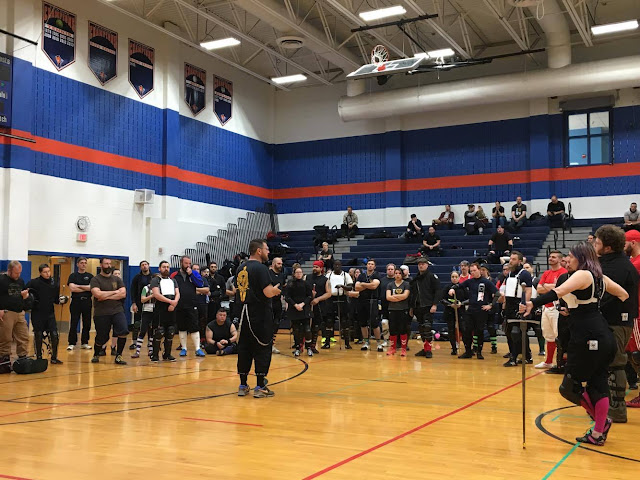Different but same
I was quite honored to be invited to teach and partake at the FNY event (Fechtschule New York) this past weekend. FNY is a weekend of seminars and a tournament that dwells in the world of HEMA (Historical European Martial Arts). The majority of the attention, however, goes toward German Longsword techniques. The techniques are based on medieval manuscripts that are studied to recreate what was described.
Michael Edelson was the person who created and led this event. He is the head of the NYHFA (New York Historical Fencing Association) that is very skilled and quite the pioneer to help the art of German Longsword grow. I have known him for quite some time and saw the growth of NYHFA and became a fan, cheering on his group at tournaments by watching videos and media shown.
The seminar I was invited to teach was gekken . Gekken is the way we practice free form sparring with foam swords (that are quite hard). Gekken is meant to be a form of practice to apply the techniques that you have learned through kata or information passed on by your teachers. In Japanese swordsmanship, other than kendo , sparring is not practiced much. However, in HEMA, sparring after studying the manuscripts is the main portion of practice.
What I taught at this seminar is what I've learned and applied to in gekken . Even though it is a swordsmanship from a different culture, there are standard concepts that are the same. Regardless of the type, a sword is a sword (although German longsword is longer, double edge, and has a crossguard ), the ideas of strategies used based on kamae (stance/ward), how techniques transitioned to another and being an expression of what is being represented, is the same! When I taught the seminar, I was able to match and interact with numerous amount of people I have never met or practiced with. Even though I've been teaching so long, facing anyone new in gekken is one of the things that will always excite me just like how Hataya sensei and members of the Machida dojo does as well. It's a true test of yourself seeing if you can hold your technique regardless of who your opponent is. You have confidence and trust your technique and get insight on why or why it didn't work instead of just swinging around.
Now, I'm not saying gekken is something all styles should do just like tameshigiri. However, when I do see most JSA practitioners try gekken , they will have the beautiful form shown through basics and kata , but those are not applied and is also the same for tameshigiri as well. However in kata , what is taught and presented is how to use a certain strategy by technique to control your opponent to get the result that you would like. Many go into just swinging the gekken sword to land a hit (although practitioners who have experience in other arts bring a more applicable expression). I prefer to understand and express the forms in a way that I can truly understand (or try to at least haha) rather than just knowing steps.
If you watch HEMA practitioners or matches, the methods used to spar are the ones that have been taught and practiced through the forms that have been studied. I find this very remarkable since I am used to seeing the result of most JSA practitioners. Regardless of win or loss, most tried to attemptproper technique rather than just swing mindlessly. High-level HEMA practitioners truly understand the techniques from good practice and are able to use the ones they are strongest with to fight other opponents when they would. This is the same approach that I bring to when I practice gekken .
Practicinggekken to just beat opponents is not a good perspective and I believe that practicing to better the understanding of our forms should be the main reason. It is great to be able to defeat an opponent but are you winning by just swinging numerous times or using physical ability? Or are you using the ideas expressed through the kata that you have learned?
Being at FNY was a great experience to see a great representation of the approach I trybring to gekken and strengthening it. This is something that Hataya sensei has me present as well. The spirit that practitioners were giving regardless of win or loss to improve their technique is a teaching aspect in itself! If you do try gekken, I recommend the mindset that I described in this post! Thank you to Michael Edelson, Tristan Z, and the NYHFA crew for having me.
If you watch HEMA practitioners or matches, the methods used to spar are the ones that have been taught and practiced through the forms that have been studied. I find this very remarkable since I am used to seeing the result of most JSA practitioners. Regardless of win or loss, most tried to attempt
Practicing
Being at FNY was a great experience to see a great representation of the approach I try







Comments